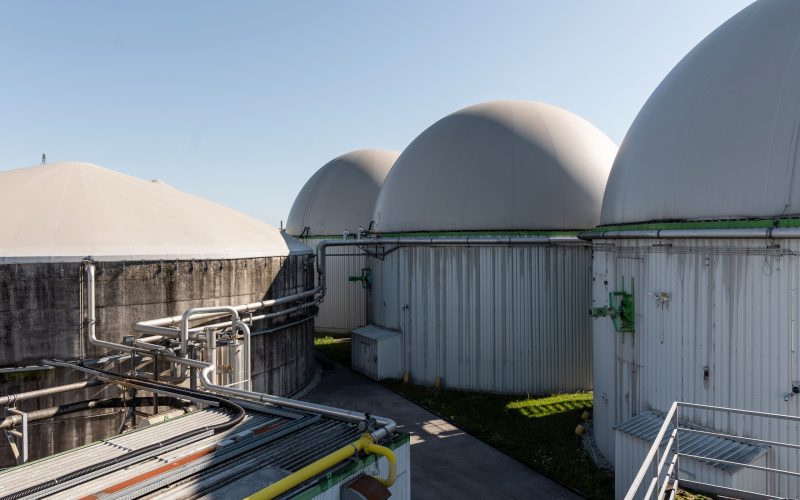Online Seminar “Review of Climate Action and Transition to Sustainable Energy in Ukraine” — the results and materials of the online seminar
On November 18, an online seminar “Review of Climate Action and the Transition to Sustainable Energy in Ukraine” was held as part of the project “Civil Society for Sustainable Energy – Local to National in Eastern Europe (SELNEE)”.
Generally, more than 1,700 stakeholders, including government, civil society, business and academia, participated in the workshop through direct participation on the online platform and in real-time online viewing.
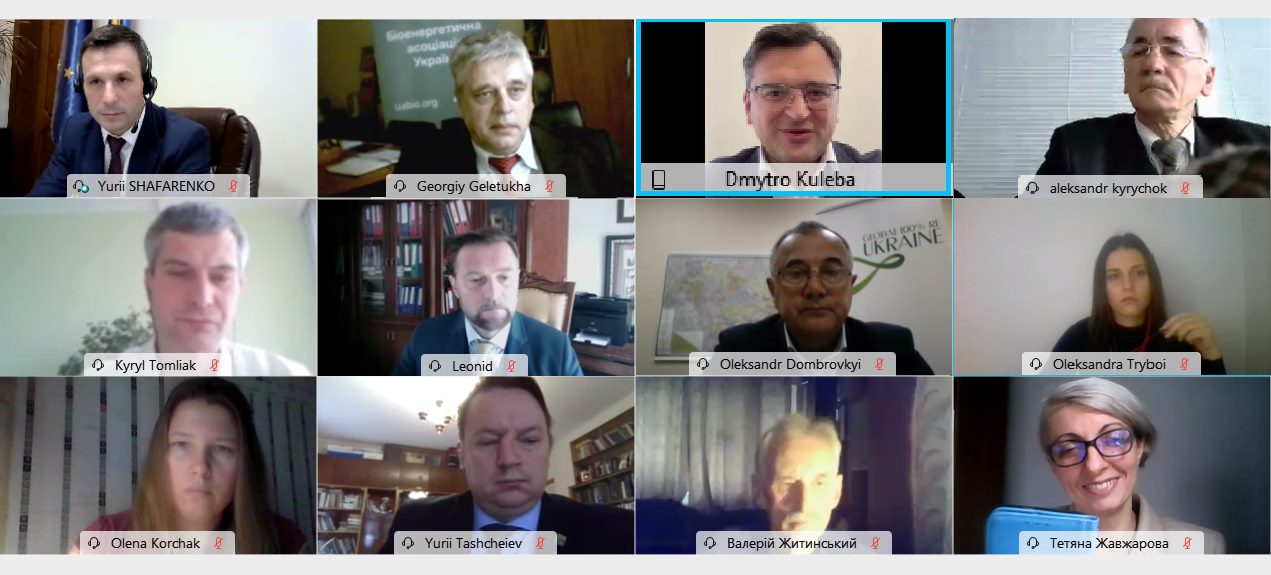
Organizers: Renewable Energy Agency, Bioenergy Association of Ukraine, Civic Union Global 100RE UA, International Network for Sustainable Energy INFORSE-Europe
The online seminar was attended by the Minister for Foreign Affairs of Ukraine Dmytro Kuleba, Deputy Minister of Environmental Protection and Natural Resources of Ukraine Iryna Stavchuk, Deputy Head of the State Agency for Energy Efficiency of Ukraine Yuriy Shafarenko.
In addition, the Chairman of the Board of UABIO Georgy Geletukha publicly presented the vision of the Bioenergy Association of Ukraine on the key provisions of the Roadmap for the development of bioenergy in Ukraine until 2050.
Roadmap for the development of bioenergy in Ukraine until 2050: vision of the UABIO
The program of the seminar included speeches by representatives of civil society on the transition of Ukraine to sustainable energy. During the online seminar, representatives of civil society institutions made a joint statement to the Cabinet of Ministers of Ukraine headed by the Prime Minister of Ukraine Denis Shmygal on the need to develop and approve a national Green Deal.
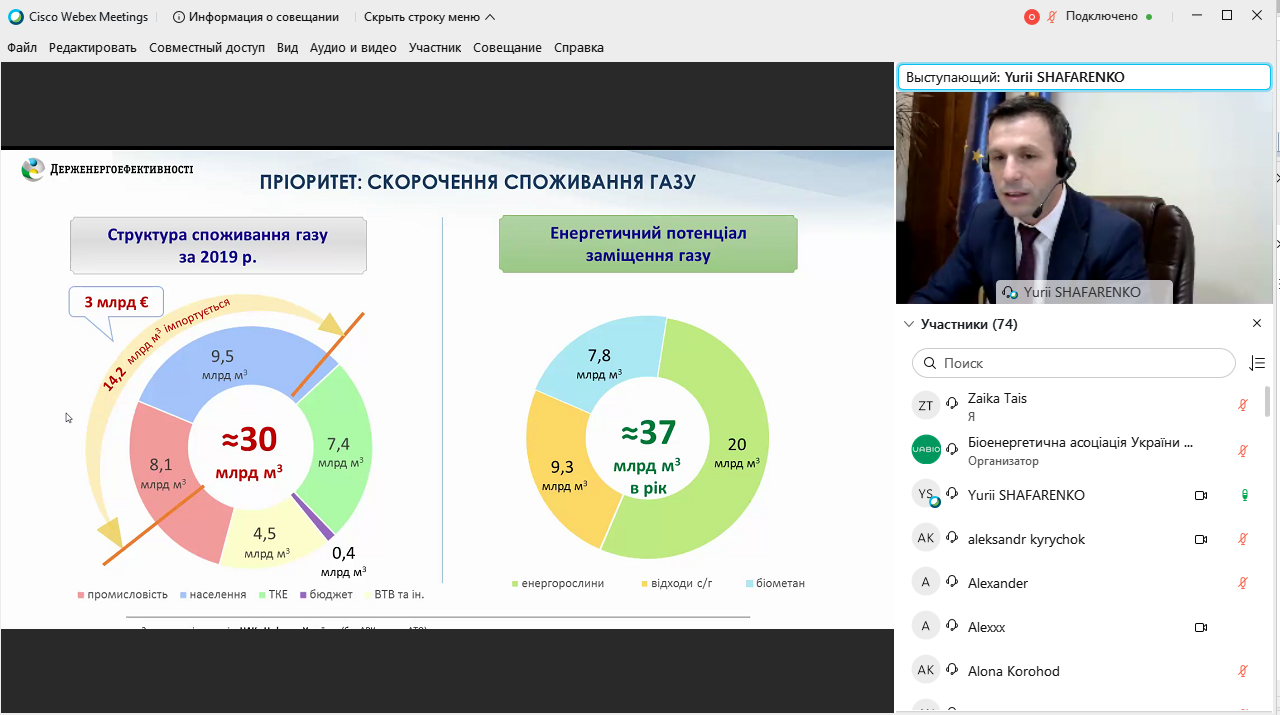
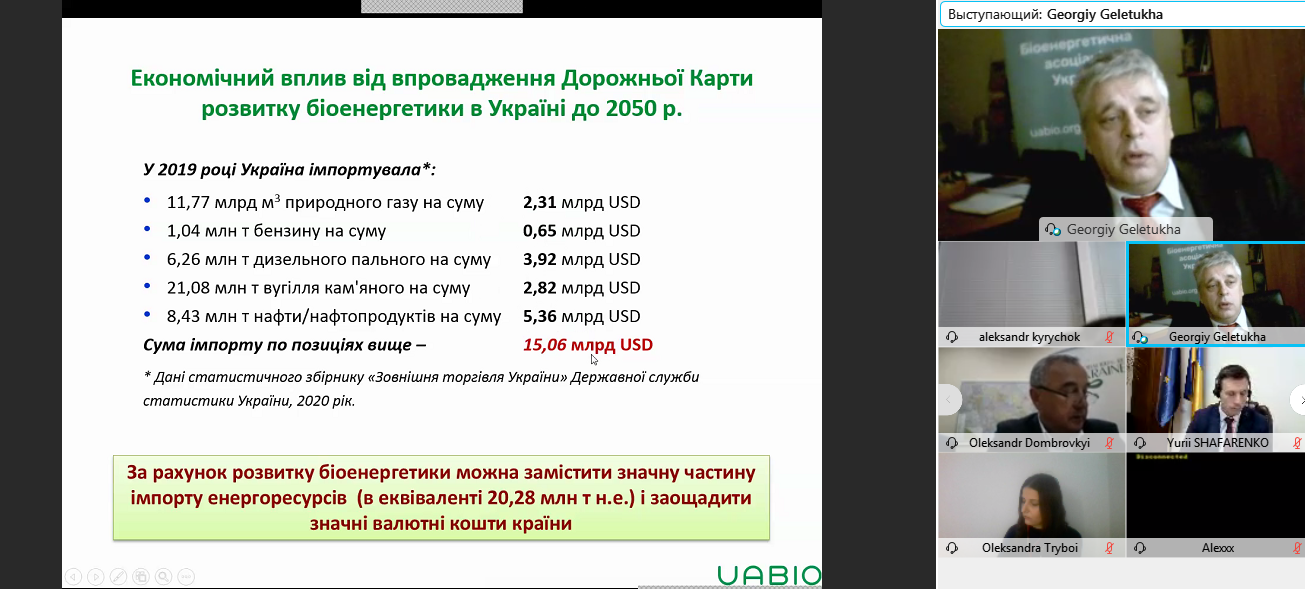
.
Opinions of speakers:
- Dmytro Kuleba, Minister of Foreign Affairs of Ukraine: Sustainable transition of Ukrainian energy to a new reality is an element of foreign policy. It is very important that we build this synergy within the country of all the authorities, experts and civil society involved in order to ensure this transition. The success of Ukraine’s “green” energy transition is not only a domestic and domestic economic success, but also Ukraine’s foreign policy image.
- Yurii Shafarenko, Deputy Head of State Agency on Energy Efficiency and Energy Saving of Ukraine: We need to gradually abandon the import of energy resources, as Ukraine can provide itself with the necessary and renewable energy resources. Three areas such as energy crops, agricultural waste and biomethane have an energy potential that exceeds all current natural gas imports to Ukraine. Relevant bills to stimulate the development of these areas are currently being agreed with other ministries. I urge all those interested in the adoption of these bills to provide their letters of support, which are necessary for their approval by the Ministry of Finance of Ukraine.
- Kyrylo Tomliak, manager of EBRD program: Ukraine’s goal of reducing greenhouse gas emissions should be ambitious enough, but taking into account the realism of the commitments we can make. But we also have the capacity, within the national defined contribution (NI) and the policy to be implemented to implement this NAV, to give priority to those sectors that not only reduce GHG emissions but also achieve other sustainable development goals.
- Oleksandr Diachuk, leading researcher of Institute for economics and forecasting of NAS of Ukraine: To date, the Intergovernmental Panel on Climate Change has developed four main scenarios for reducing greenhouse gas emissions within the renewal of Ukraine’s national contribution: basic (partial implementation of existing legislation without structural changes in energy and economy); reference or current policy scenario (if we do not fulfill our obligations to the EU, but our internal obligations, ie full implementation of already developed legislation, including the Energy Strategy); the scenario of a climate-neutral economy (which would correspond to the Paris Agreement, the directions and developments that are currently taking place in the EU); as well as a combined scenario (envisaging Ukraine’s achievement of climate neutrality in 2070).
- Oksana Aliieva, “Climate Change and Energy Policy” Program Coordinator at the Heinrich Boell Foundation, Kyiv Office Ukraine: It is distributed renewable energy that is able to meet the socially just component of transformation, which must be respected so that not only environmental benefits are obtained as a result of decarbonisation, but also society, especially those most in need, received appropriate social benefits. For example, when we talk about property, RES belong mainly to the oligarchs in Ukraine, and this creates a negative image of this industry. Therefore, if there were more distributed generation, the level of tension in the perception of renewable energy would be lower. However, the problem is that when we talk about distributed generation, there are several points of view on this term, as a clear definition has not yet been formulated in Ukraine.
- Oleksiy Korchmit, Head of NGO «Ukrainian ESCO-Association»: The State Decarbonization Fund as an instrument of state incentives does not provide for the creation of a public figure. Why? We already have the results of creating public figures who have not shown themselves effectively enough in their work. We anticipate that this will be a separate type of budget expenditure, like the State Fund for Regional Development or the Road Fund. And the Fund will be managed and administered by existing institutions, public authorities in accordance with the procedure for using funds approved by the Cabinet. We hope to see such funding in the draft budget for 2021.
- Iryna Stavchuk, Deputy Minister of Ecology and Natural Resources of Ukraine: The topic of climate change and Ukraine’s participation in the Green Agreement has recently been very actively discussed at the level of the Government and ministries, at the level of international consultations with the EU. The Green Agreement is the same framework for addressing climate change, and the main process in which sectoral targets, sectoral contributions and the national target are currently being prepared and defined is the preparation of a Nationally Defined Contribution. Starting next week, we are already planning a public consultation and a full presentation of the procedures and calculations that will help identify the NVB.
- Georgii Geletukha, Chairman of the Board of the Bioenergy Association of Ukraine: More than 120 countries, with a total GDP of about half of the world, already have set goals for achieving climate neutrality and have either developed their own strategies to achieve such goals or are in the process of developing such strategies. Therefore, we believe that it is time for Ukraine to join such a process, develop a national Green Deal, change Ukraine’s Energy Strategy until 2050 and become part of this civilizational movement of most countries, which is currently taking place.
- Oleksandr Dombrovskyi, Chairman of the Board of Civic Union “Global 100RE UA”: Today, in the context of the coronavirus, one of the key tasks for the future is to find the optimal ratio between sustainable development and sustainable consumption. How much to consume in order not to pollute our world, and how much to produce in order to have the appropriate economic parameters for a stable existence? In addition, when I hear that “green” energy is more expensive than energy from fossil fuels, it is at least incorrect, because you need to understand where government subsidies are and where they are not. “Green” energy in its technology, innovative tools is and can be cheaper than traditional.
- Aleksandr Riepkin, President of Ukrainian Hydrogen Council: As for the Ukrainian hydrogen strategy, the goals are clearly defined. We need to have documents by the first quarter of next year, on the basis of which we will be able to develop a national strategy and road map in the shortest possible time. An effective, not a paper, hydrogen strategy should include mechanisms for using Ukraine’s existing gas transmission network and logistics capabilities, develop domestic programs (such as transport and heating), have an economic basis, and correlate with EU policy (our foreign partners are very helpful).
- Oleh Savitskyi, Board Member of NGO Ecoaction, climate and energy policy expert at the Climate Action Network: More than 30 experts representing 10 organizations worked together on the roadmap for Ukraine’s climate goals until 2030. We have identified 5 areas: energy, buildings, transport, waste management, as well as a common goal for the agriculture, forestry and land use sectors. Currently, the main recommendation from the Government’s civil society is that all strategic documents should have a component of climate policy, reduction of greenhouse gas emissions and adaptation. The public should be part of the policy-making process.
- Oleksandra Tryboi, senior consultant of Civic Organization “Renewable Energy Agency”, board member of INFORSE- Europe, International Network for Sustainable Energy: I would like to share the results of the SELNEE project, which includes a review of climate action and the transition to sustainable energy in Ukraine. We analyzed what Ukraine lacks for the transition to renewables. The main barriers are lack of political will, instability of state policy in the field of RES, problems in the electricity market, illiberalized heat market, unpreparedness of the power system to close coal capacity, lack or inefficiency of certain mechanisms to stimulate RES and energy efficiency, problems of the bioenergy sector. energy poverty “of the population.
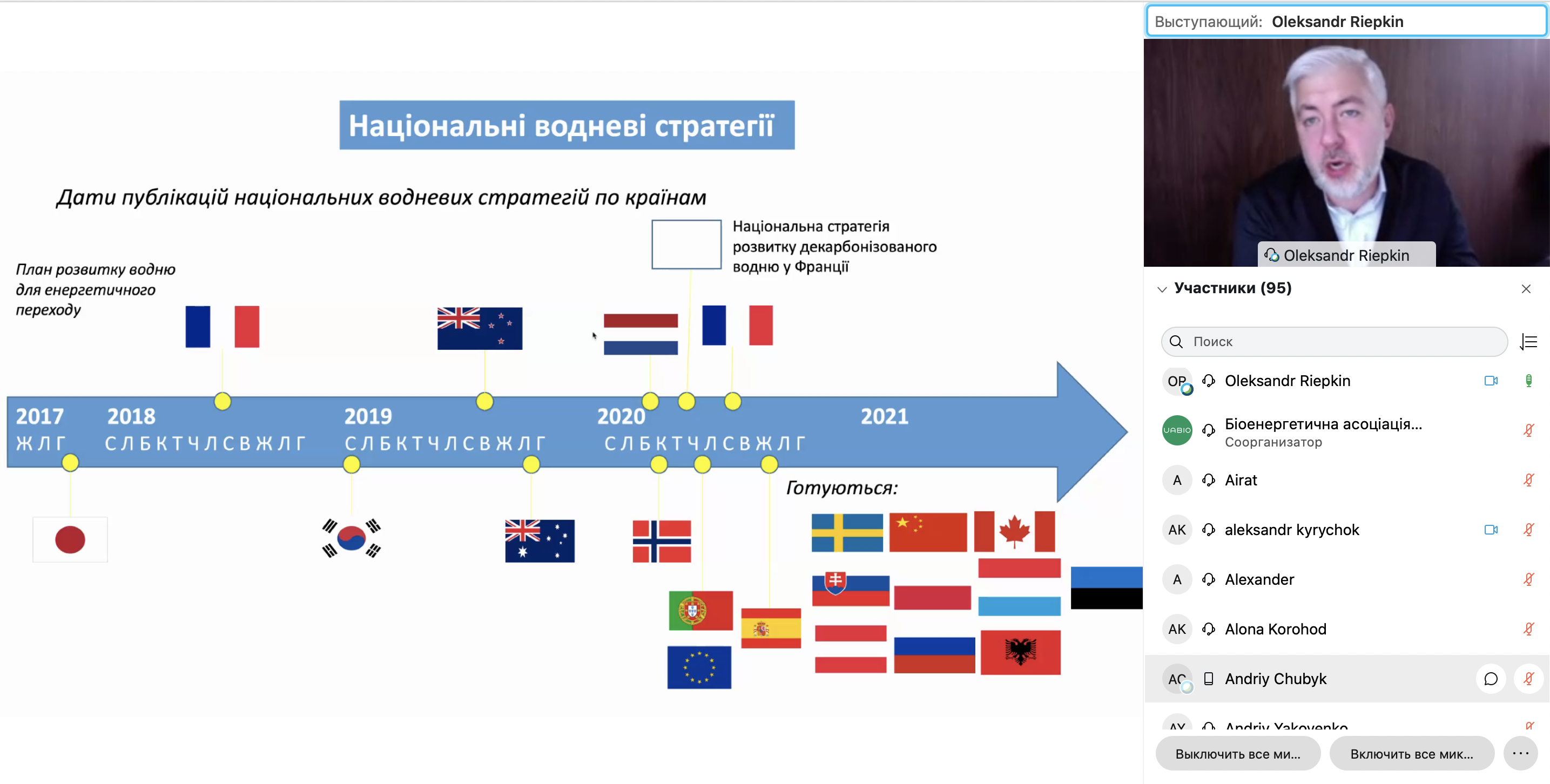
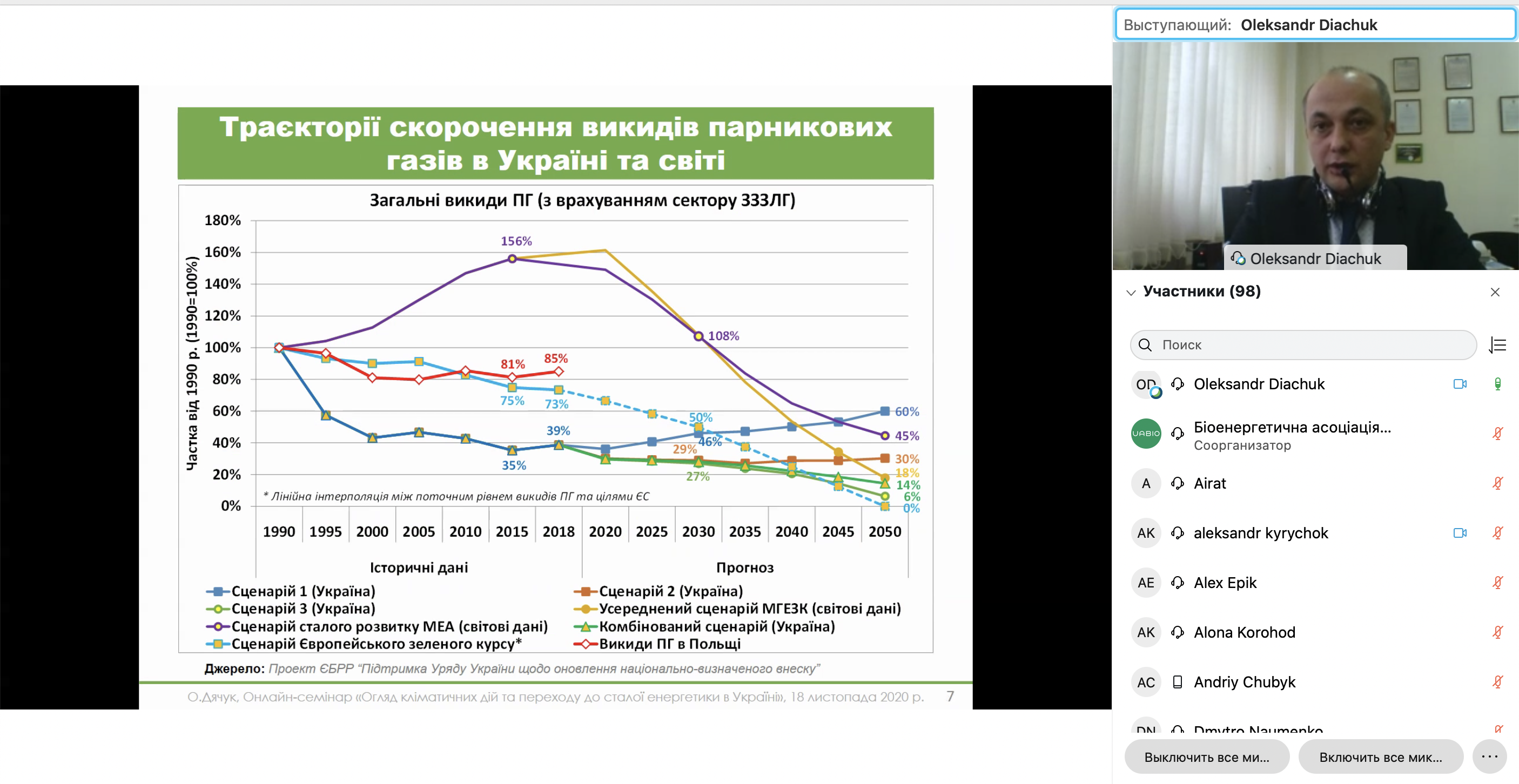
Speakers’ presentations (in Ukrainian):
- Global 100% RE UA: Views on the development of energy in Ukraine until 2050 – 2070. Oleksandr Dombrovskyi, Chairman of the Board of Civic Union “Global 100RE UA”
- Roadmap for the development of bioenergy in Ukraine until 2050. Georgii Geletukha, Head of the Board of Civic Organization “Renewable Energy Agency”
- Prospects of the bioenergy sector of Ukraine regarding the implementation of the national determined contribution (NDC). Kyrylo Tomliak, manager of EBRD program
- Roadmap for the development of green hydrogen in Ukraine until 2050. Aleksandr Riepkin, President of Ukrainian Hydrogen Council
- Scenarios of Ukraine’s energy development until 2050 under the implementation of the Paris Agreement. Oleksandr Diachuk, leading researcher of Institute for economics and forecasting of NAS of Ukraine
- Distributed RES generation as a component of the energy transition. Oksana Aliieva, “Climate Change and Energy Policy” Program Coordinator at the Heinrich Boell Foundation, Kyiv Office Ukraine.
- Roadmap of Ukraine’s climate goals until 2030. Public vision. Oleh Savitskyi, Board Member of NGO Ecoaction, climate and energy policy expert at the Climate Action Network
- State Decarbonization Fund: a sustainable instrument of state incentives. Oleksii Korchmit, Head of NGO «Ukrainian ESCO-Association»
- Review of climate actions and the transition to sustainable energy in Ukraine. Oleksandra Tryboi, senior consultant of Civic Organization “Renewable Energy Agency”, Board Member of INFORSEEurope, International Network for Sustainable Energy


